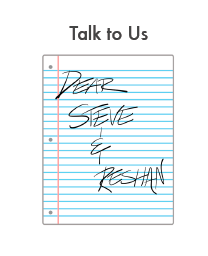Reshan and I published our book three days ago, and we have enjoyed several benefits that are simply not available to writers who publish on paper.
First, we have been able to share demo copies of the book instantaneously via email. So if someone was excited about the book, we could get it into his/her hands right away, further stoking their interest in, and energy for, our project. That's good for the writer and good for the reader.
And speaking of exchanges, our book has allowed us to speak directly -- and immediately -- with our readers AS THEY READ THE BOOK.
As readers complete chapters of our book, they see a small invitation:
Here's one post from Rob V. What I love most about it is its searching quality and the way it extends the thinking Reshan and I present in our book:
Reshan (and Steve)
At the school where I work as the Academic Technology Coordinator we are in the process of bringing the "design and programming" aspect of technology into the conversation preK to 12. The other big conversation that I am interested in is how the school, which has a solid tech foundation, can now use the technology as a means to move away from teacher focused curriculum to one that "emphasizes greater agency and ownership". This leap, in many ways, is the paradigm shift that truly needs to happen in schools for the possibilities of this technology to come alive. Technology is pushing that question and it is up to educators and educational leaders to take up the challenge to systematically rethink how instruction happens. In many places, I fear, this challenge will go unanswered. But, with great visionary AND experienced leadership we can radically change the experience of learning. In all this chapter raises some good points and heads us in the right direction.
When you publish your thoughts on paper, they are often fairly final. If you change your mind about something, you have to write another book. (Another benefit of our approach is that we can make adjustments as we go -- more on that later.) If someone wants to talk back to you, they have to track you down and hope you will return the call or email.
When you publish in the iTunes / iBooks ecosystem, your thoughts are easily tied to the thoughts of others. You are one author among many possible authors, a common host rather than a privileged guest.
I love good, old-fashioned books, but I love the new kinds of books that are now possible, too.
~Steve


 RSS Feed
RSS Feed
